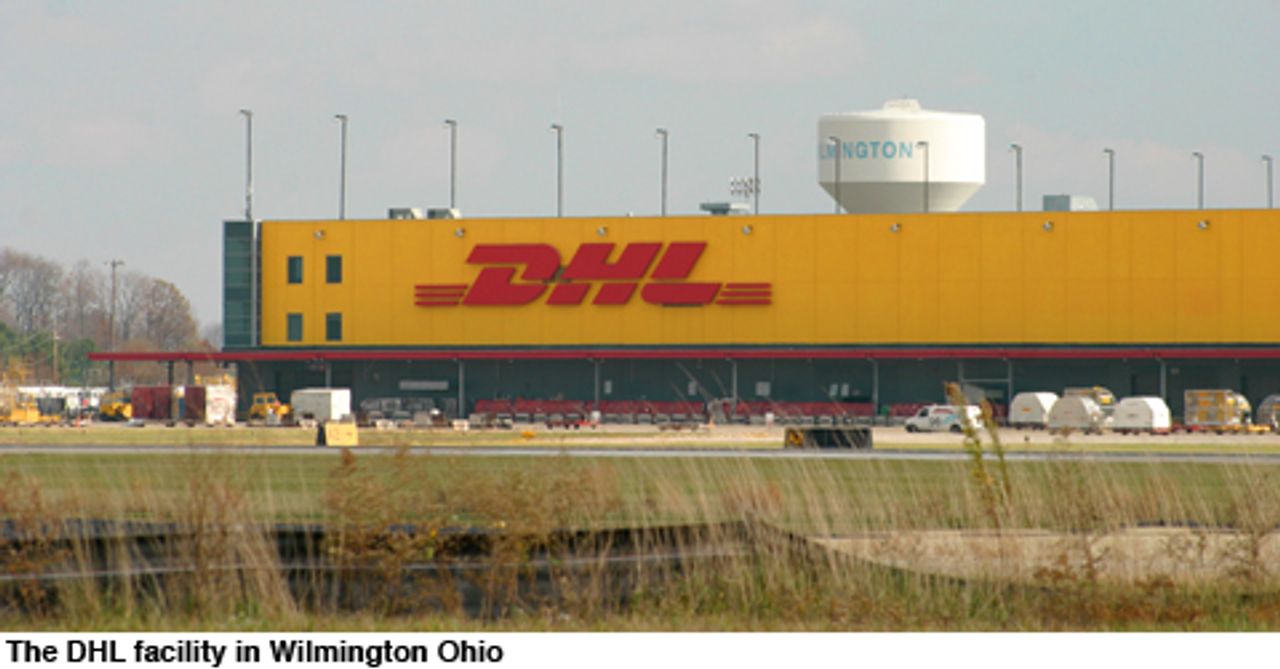In a segment entitled "The Winter of Our Hardship," Sunday night's broadcast of "60 Minutes" on CBS featured a report on Wilmington, Ohio, the small town devastated by the shutting down of its largest employer, international shipping company DHL Express.
In the midst of the economic crash of 2008, DHL began losing $6 million per day in the United States. As a result, the shipping company began closing down its domestic operations in November. While the carrier plans to continue shipping parcels to and from the US, it will no longer offer ground or air services within the country. DHL is currently in talks with UPS, hoping to set up a contract under which that company would handle DHL's domestic air shipments.

The DHL hub in Wilmington—in southwestern Ohio—was located in the Wilmington Airpark, the nation's largest privately owned airport, 2,200 acres in size and former home to the Clinton County Air Force Base. DHL purchased the Airpark for just over $1 billion in 2003. The facility employed 8,000 workers; Wilmington has a population of 12,000.
"60 Minutes" correspondent Scott Pelley introduced the segment by pointing out that the experience of the Wilmington DHL workers was "part of the news this past week that new claims for unemployment benefits are the highest in 26 years." He added, "Since the economic crash of ‘08, taxpayers have committed to more than a trillion dollars in various bailouts of Wall Street, but not much of that is reaching families in crisis."
Among those profiled in the Wilmington report was Mike O'Machearley. His son was killed in the skies over Fallujah on November 2, 2003, when his helicopter was shot down. Sixteen others died in the attack. Following this incident O'Machearley got a job driving a DHL bus at the Airpark. Previously employed on a machining line in an auto-parts factory, O'Machearley obsessed over the loss of his son all day long at work. The new job with DHL, O'Machearley said, "meant that I could see different people and talk to people and kind of become human."
Laid off from the job that meant so much to him, O'Machearley is now attempting to turn his hobby of making engraved hunting knives into a business, hoping to sell his work to collectors. His prospects are fairly grim. O'Machearley tells "60 Minutes," "We're going to have no electricity Tuesday nights! We're going to light the oil lamps and play checkers." He considers Wilmington to be "ground zero" in the current economic collapse.
Geri Lynn Thomas, whose hours were cut in half at DHL, has been stockpiling food since the DHL crisis struck the town. She buys an extra item of food when she can and saves it for the even more difficult times yet to come when she is inevitably laid off herself. Through tears, Mrs. Thomas tells Pelley she had to pull her son out of college early. "He didn't go the fall and winter sessions this year," she says, "we don't have the money." "It was my dream," she adds, "for my kids to have better than I had and now they're not going to."
During the "60 Minutes" broadcast, Wilmington's mayor, David Raizk, made several dire predictions. Raizk estimated that 1 in 5 businesses in the small town could fail due to the DHL shutdown. Raizk also warned that a local hospital could be in danger of closing its doors: "Eight million dollars' worth of revenue for our local hospital was derived from the insurance [of workers]. Now if you take away that $8 million, plus how much charity care is going to increase because people don't have insurance, and you could put the hospital out of business."
The only organization currently expanding in Wilmington is the Sugar Tree Ministry's soup kitchen. Kitchen operators have been so overwhelmed by the need for food they have been forced to remodel their facility, making room for up to 200 more seats. This doubles the kitchen's previous capacity, a startling indicator of distress.
According to the "60 Minutes" report, US Senator Sherrod Brown, a Democrat, is calling for $100 million in federal aid, not only for Wilmington, but for "distressed communities all around the country." Even if that were to come to pass, the amount is pitifully inadequate in relation to the dimensions of the crisis.
CBS reports that an economic task force set up by Mayor Raizk has declared "the projected economic impact of the job losses [for Wilmington alone] will exceed $400 million annually." Not for nothing does Scott Pelley describe Wilmington as going through the "trauma of [Hurricane] Katrina without the physical damage."
Meanwhile an emergency $500 million federal loan has been organized to revive Ohio's state unemployment benefit fund, which went bankrupt last week. There is also a $4 million program in place to provide workers with training in computer skills, but there are no jobs in place to hire the newly skilled workers.
The Wilmington situation shows that while the sky's the limit for the financial elite responsible for the crisis, paltry sums are provided for its victims.
The news report of the struggles faced by Wilmington residents comes within a week of Barack Obama's inaugural address in which he placed blame for the economic crisis on the shoulders of working people. Calling for further "sacrifices" from the working class, the speech found support and appreciation in the mainstream media; in fact, the "60 Minutes" report takes its title from a phrase in Obama's speech.
The conditions faced by Wilmington, Ohio's DHL workers, documented in the "60 Minutes" segment, refute the libelous claims made against working people by Obama and his defenders. Factoring in the ripple effect of the DHL shutdown on other Wilmington businesses, analysts estimate that 10,000 jobs altogether will be wiped out there.
In a town with a population of just 12,000, damage of this kind threatens to turn Wilmington into a Midwestern ghost town. Its residents have no more sacrifices left to offer.
